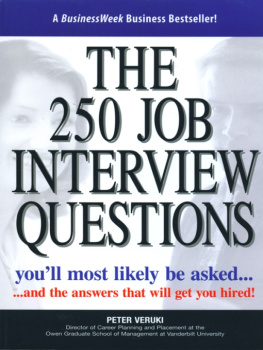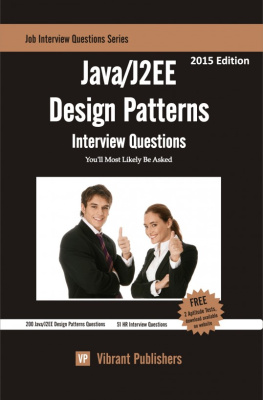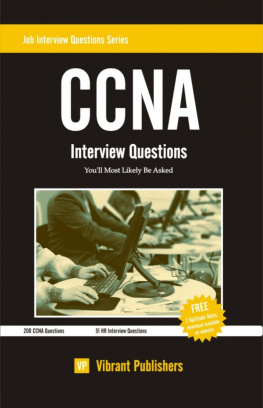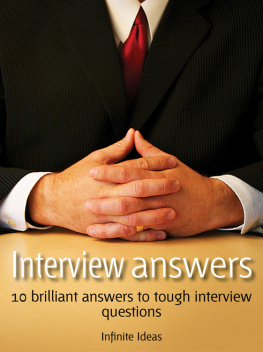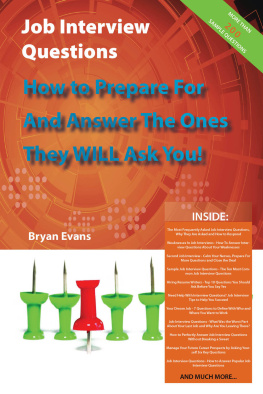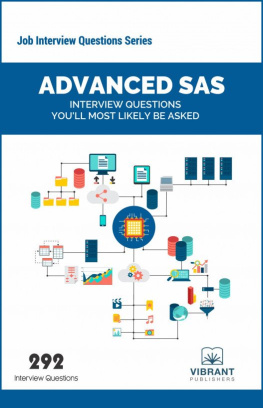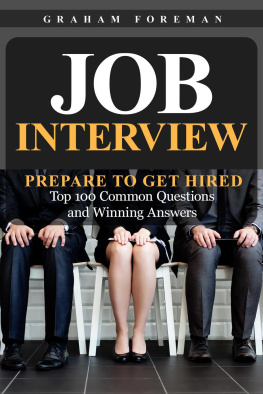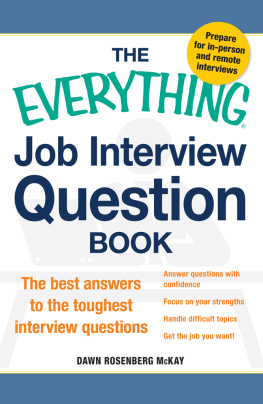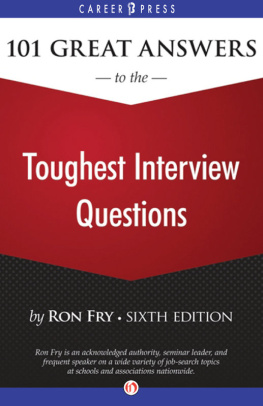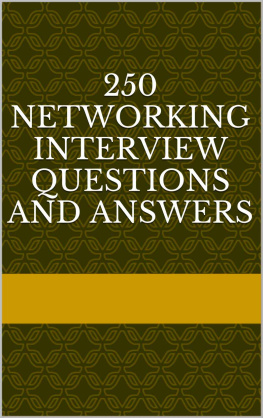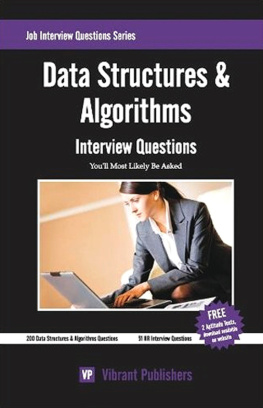THE
250 JOB
INTERVIEW
QUESTIONS
youll most likely be asked...
...and the answers that will get you hired!
THE
250 JOB
INTERVIEW
QUESTIONS
youll most likely be asked...
...and the answers that will get you hired!
by Peter Veruki

Adams Media Corporation
Avon, Massachusetts
Copyright 1999, F+W Publications, Inc. All rights reserved. This book, or parts thereof, may not be reproduced in any form without permission from the publisher; exceptions are made for brief excerpts used in published reviews.
Published by
Adams Media, an F+W Publications Company
57 Littlefield Street, Avon, MA 02322. U.S.A.
www.adamsmedia.com
ISBN 10: 1-58062-117-1
ISBN 13: 978-1-58062-117-5
Printed in Canada.
T S R Q P O
Library of Congress Cataloging-in-Publication Data
Veruki, Peter.
The top 250 job interview questions youll most likely be asked and the answers that will get you hired / by Peter Veruki.
p. cm.
Includes index.
ISBN 1-58062-117-1
1. Employment interviewing. I. Title. II. Title: top two hundred fifty job interview questions youll most likely be asked.
HF5549.5.I6V47 1999
650.14dc21 98-50809
CIP
This publication is designed to provide accurate and authoritative information with regard to the subject matter covered. It is sold with the understanding that the publisher is not engaged in rendering legal, accounting, or other professional advice. If legal advice or other expert assistance is required, the services of a competent professional person should be sought.
From a Declaration of Principles jointly adopted by a Committee of the
American Bar Association and a Committee of Publishers and Associations
This book is available at quantity discounts for bulk purchases.
For information, call 1-800-289-0963.
Table of Contents
B EFORE THE J OB I NTERVIEW
Okay, so youve scheduled a job interviewor maybe even a few. Now what? This chapter will show you six key ways to turn your job interviews into job offers, including how to develop your personal themes for the interview and how to research potential employers.
Here youll find all the tips you need for setting the right tone. Topics include dressing for success, what to bring with you, the importance of body language, overcoming nervousness, and presenting a professional image.
This chapter will show you how to navigate an interview conversation. It presents the differences between first and second interviews and the strategies you should employ. Youll also find typical questions that you can ask them.
T HE T OP 250 Q UESTIONS
This chapter presents two hundred of the most common interview questions you must be prepared to answer. The questions are arranged in an order consistent with the themes described in chapter 1. Most interviews are based on these questions, or variations of the ones that appear here and in chapter 5.
Here youll learn how to handle killer interview questions with finesse, including specific questions for first-time job seekers, experienced professionals, career changers, and other special groups. Theres also a special section on handling illegal interview questions.
A FTER THE I NTERVIEW
You flew through your interview no problem. Now what? This chapter will show you how to follow-up on first interviews with sections on writing a follow-up letter, handling rejection, and moving on to the next step.
Here youll learn about the important factors to consider when weighing an offer, including salary, benefits, work environment, and more. This chapter also includes expert negotiating techniques to help you get what you want.
Acknowledgments
Thanks to the following people whose generous time and expertise made this book possible:
Virginia Alonzo, Javier Amador-Pea, Rebecca Jesperson Anthony, Linda Armstrong, Linda Arslanian, MS, PT, Jennifer Barr, Elise Bauman, Susan Beale, Edward Beaudoin, Julianne Bennett, Jeff Benson, Bill Brands, Russell Brothers, Rob Bunnell, Michael J. Carriero, Christopher Ciaschini, Elizabeth Clarke, Nicole Coady, Marisa Cohen, Andrew J. Conn, Susan Crawford, Catherine Crowder, Bob Davis, Dental Fill-ins, Laura DiBenedetti, John J. Diggins, Richard Dreier, James B. Earley, Lisa Edenton, Katy Edmonson, Jeff Eisnaugle, Army Ellis, Glen Fassinger, Joanne Franco, Jill Gabbe, Jan Gentry, Clifton Gerring, Dov Goldman, Al Golub, Jeffrey M. Graeber, Jim Grobman, Ron Grover, Steve Grune, Bob Hale, Pete Harper, Gary Hayden, Margot T. Healy, RD, Catherine A. Hegan, Catherine Holsen, Denise Humphrey, Beryl Israel, Wayne Jackson, Michelle Johnson, Chuck Kelly, Keith Kleinsmith, J. Patrick Knuff, Linda Kosarin, Jennifer Kove, Rowena R. Krum, Heather Kuty, David E. Lambert, Jr., Ann C. Lee, Howard Levinson, CPP Pam Liflander, Mark A. Linnus, Andrew Lobo, Michael G. McArdle, Mark McAuley, John McCauley, Nancy McGovern, Terence McGovern, MSW, LICSW, Jim Mellarkey, Bruce Menin, Arnold Most, Jennifer Most, Karen M. Nichols, Elizabeth OBrien, Carrie Oliver, Richard Oliver, Susan Oliver, Guy Pacitti, Stefan Pagacik, Thomas V. Patton, Pam Perry, Joe Petrie, Jeff Phillips, Rosalie Prosser, Jan Quiram, Rodney Ramsey, Gigi Ranno, Andy Richardson, Gary E Richardson, Alan Ritchie, Kent Rodgers, Gerald Roe, Bob Rogers, Thomas J. Rusin, David Ryback, Jeremy M. Sherber, Donna Shervanian, Aryana Soebagjo, Judy Spinella, John Stagliano, Joseph Steur, Deborah Story, Allan Tatel, Bob Teague, Jill Todd, Nancy True, Catherine Tuttle, K. A. Vlahos, Mark Waldstein, David Williams, Ron Wilson, Frank Winslow, David S. Wolff, Bill York, Diane V. Yurkewicz, Reeve Zimmerman, Michael Zitomer, and Frank J. Zych, Jr.
Introduction
O ur goal for this book is to provide you with 250 of the most commonly asked interview questions. Some are tough. Some are easier. Some are downright tricky. But all of them can make or break an interview.
Answering a battery of interview questions can feel something like running a gauntlet. A little preparation, though, and the assistance of this book can help see you through, safe and sound. The interview questions and answers included here should give you a sense of how questions should be handled. They shouldnt be used as the basis of canned or scripted answers. Adapt these responses to your own circumstances, and remember that the way you respond can be just as important as what you actually say.
Keep in mind as youre reading that behind every interview question is a hiring managers concern. And even though you may not encounter precisely the same questions that are included here, the concerns of the hiring manager remain the same. Your job is to define each concern and then alleviate it with a well-thought-out response. This book is designed to help you do just that.
Additionally, well show you how to land job interviews, find and research potential employers, and develop your own themes for the interview. Weve included valuable advice for handling stress questions, strategies for second and third interviews, and information on how to negotiate job offers to get what you want. Youll also find specific questions geared toward those in special situations, including career changers, recent graduates, and people re-entering the workforce. Theres even a section on illegal questions!
So keep reading, and rememberyoure on your way to a fabulous career!
P ART O NE
Before the Job Interview
C HAPTER 1
Preparing for the Interview
T oo many job seekers jump right into a full-scale job search without much advance preparation other than putting together a resume. A serious mistake! Although your resume may get you job interviews, to win job offers, you must prepare yourself further. Its vitally important to distinguish yourself in some positive way from other candidates vying for the same position. One way of accomplishing this is by developing several themes that you continually refer to throughout the job interview. This enables you to emphasize your strongest points and ensures that youll leave a positive impression in the recruiters mind.
Next page
